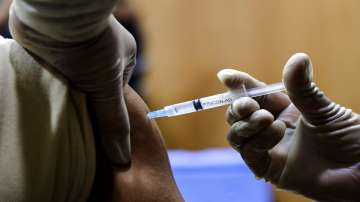India becomes second country after US to cross 20 crore cumulative vaccination coverage
As the country faces the deadly second wave of coronavirus, India has become the second country after the United States to cross 20 crore cumulative COVID-19 vaccination coverage.

As the country faces the deadly second wave of coronavirus, India has become the second country after the United States to cross 20 crore cumulative COVID-19 vaccination coverage. Ministry of Health and Family Welfare on Wednesday informed that 42% population above 60 years have received their first dose of the vaccine.
"India is the second country after the USA to achieve this coverage in just 130 days. The US took 124 days to reach the 20 crore mark," Ministry of Health and Family Welfare said.
Meanwhile, a study conducted by a private healthcare facility in Delhi has found that vaccines were found to be effective in combating the mutated variants of coronavirus and guarding against severe infection, hospitalisation and even death.
There have been reported cases of infections after partial or complete vaccination occurring in some people. There have also been instances where people have succumbed to the virus after being vaccinated fully.
According to the Indraprastha Apollo Hospitals, the study was conducted as concerns have been raised on the efficacy of vaccination against the mutated variants of COVID-19.
The study was carried on 69 symptomatic healthcare workers working at the hospital, who tested positive for COVID-19 despite being administered the Covishield vaccine, during the first 100 days of the vaccination drive earlier this year.
ALSO READ | Vaccine absolutely important to save lives, defeat Covid: PM Modi
Among the 69 people, 51 were fully vaccinated with two doses and the remaining 18 were partially immunised with a single dose, prior to acquiring the infection, said Dr Anupam Sibal, Group Medical Director and Senior Pediatric Gastroenterologist of Apollo Hospitals.
The predominant infections occurred from B.1.617.2 lineage (47.83 per cent), followed by B.1 and B.1.1.7 strains, he said.
"There were only two hospital admissions (2.89%) for minor symptoms, but no ICU admissions and deaths, from this group. These findings are significant because more than half of the cohort were found infected with the Variant of Concern (VoC) and still escaped from the severe illness, which could have been a severe event for them without vaccination coverage,” Sibal said.
Variants of Concern are mutated versions of a virus that may spread more rapidly or may cause severe illness and hence notified for global monitoring by the World Health Organization and other multi-lateral health agencies.
Dr Raju Vaishya, Senior Consultant, Orthopedics, Indraprastha Apollo Hospitals, and one of One of the key authors of the study, said post-vaccination, SARS-COV-2 infections were seen only in a small subset of their healthcare workers.
"Since, the immunity in an individual takes some time after the vaccination, therefore, it is essential for the vaccinated individual to be extra careful at least two weeks after the second dose of vaccination and even further, by taking universal safety precautions like maintaining social distancing, using face masks, and hand sanitation,” Vaishya said.
The study concluded that the prior vaccination in the healthcare workers offered clear protection from severe disease due to variants requiring hospital and ICU admissions and even causing deaths. This is the second study whose findings have been released by the hospital.
The facility had also released the findings of a study on May 15 which had stated that only 0.06 percent of people who contracted the virus after vaccination required hospitalisation with no ICU or ventilators used.
The second study narrowed down to analysing those healthcare workers who were affected with the more virulent strain of coronavirus, the hospital said.
The study analysed nasopharyngeal samples for genome sequencing, in collaboration with the National Centre for Disease Control (NCDC), a statement from the hospital said.
Genome sequencing is the key test to identify the nature of the virus and the variants that may emerge. Currently, this facility is available in only 10 select government organisations, but such testing facilities are now being increased in the near future by the Centre, the statement said.
ALSO READ | Only Prime Minister's photo on vaccination certificate while rest responsibility on states: Priyanka Gandhi